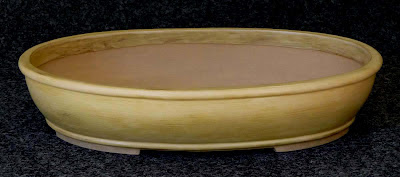I'm still working on glaze formulation and so the load was mostly more test tiles. This time I used the one Post derived glaze covered previously to try to find the spectrum of coulurs I could produce.
This is what it looked like as I lined them up.
It came to 83 tiles in total. Using the one base glaze made the process a lot simpler. I just mixed up one big batch and then distributed it evenly to the test cups with the oxide colourants. The test delivered the same consistent satiny surface with minor differences from the fluxing of the different oxide colourants. They are all pastelly tones which come about in part because of the formulation and then the level of opacifier. More vivid colours would be available with glossier formulations. I think that will be quite enough testing for me for the time being.
The two pots I glaze fired were No 17 which is the ribbed rectangular model of earlier pots, but this one with a taller foot design. I think I posted a picture previously in bisque. It ends up in this colour as a pretty 'assertive' pot. The colour comes from a mix of RIO and Managanese. A slightly higher Manganese level was applied to the area around the rib to give a patinated feel which I think I've gone some of the way towards.
The other pot is the first of the new oval design, No 20, in a mustard coloured Nickel glaze. I'm very happy with the geometry of this pot and with both I might just have cracked the high temperature slump problem, or at least worked out how to manage it.
I do have some ideas about manipulating the clay composition to reduce the slumping characteristic, but that might be something for the next time I fire.
Here is No 17. Final dimensions are 378 x 275 x 92
And No 20. Final dimensions are 405 x 304 x 81






No comments:
Post a Comment
Happy to hear your advice, feedback or questions